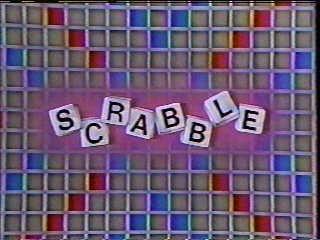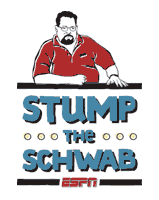
Supermarket Sweep is an American television game show. Teams of contestants answer trivia questions before competing in a timed race to gather grocery items from the aisles of a supermarket. The original show was broadcast on ABC from December 20, 1965 to July 14, 1967. Later seasons aired on Lifetime from February 5, 1990 to June 16, 1995, and later on PAX from April 3, 2000 to May 23, 2003, with reruns airing until March 26, 2004. Another version of the show aired from October 18, 2020 to January 30, 2022, also on ABC.

Scrabble is an American television game show based upon the board game Scrabble. Contestants competed in a series of rounds to fill in words within a crossword puzzle for cash. Muriel Green of Exposure Unlimited developed the idea for a television game show based upon the board game concept. During 1983, Green convinced Selchow and Righter, who at that time owned the Scrabble board game, to license Exposure Unlimited to produce the game show. Exposure Unlimited co-produced the show with Hasbro Studios, Reg Grundy Productions, and licensed the show to NBC. Scrabble aired on NBC from July 2, 1984, to March 23, 1990, and again from January 18 to June 11, 1993. Chuck Woolery hosted the program. Jay Stewart was the announcer for the first year. Charlie Tuna replaced him in mid-1985 and remained through the original run and the entirety of the 1993 revival.

Double Dare is an American television game show, produced by Mark Goodson & Bill Todman, that ran from 1976 to 1977 on CBS. The main game pitted two contestants in isolation booths attempting to correctly identify a person, place, or thing based on one-sentence clues. The bonus round then pitted the champion of the main game against a panel of three Ph.Ds, referred to as the "Spoilers". Alex Trebek was the host, with Johnny Olson and later Gene Wood announcing. The show was created by Jay Wolpert.

Now You See It is an American television game show created by Frank Wayne for Mark Goodson-Bill Todman Productions. The object of Now You See It is to answer general knowledge trivia questions by finding the answers hidden in a grid, similar to a word search puzzle.

The Cross-Wits is an American television game show. Two contestants, each paired with two celebrities, competed to fill in words in a crossword puzzle. It premiered on December 15, 1975, and lasted for five seasons until its cancellation on September 12, 1980. The show was hosted by Jack Clark, with Jerri Fiala as hostess. Announcing duties were handled by John Harlan, Jay Stewart, and Jerry Bishop. The show was produced by Ralph Edwards Productions and distributed by Metromedia Producers Corporation.

Stump the Schwab is an American game show that aired on ESPN2 and ESPN Classic from July 8, 2004 to September 29, 2006. The show featured three contestants trying to defeat Howie Schwab, ESPN's first statistician, in a sports trivia contest. Stuart Scott was the show's host. The show also appeared on Canada's The Score Television Network.
Time Machine is an American game show where contestants compete to answer trivia questions about popular culture and recent history to win prizes. The show aired on NBC from January 7 through April 26, 1985, and was hosted by John Davidson. Charlie Tuna was the announcer, with Rich Jeffries as his substitute. Reg Grundy Productions produced the series, and upon its premiere Time Machine was one of three Grundy series airing on NBC.

History IQ is a game show on the History Channel which premiered on October 2, 2000 and aired for two seasons. Marc Summers hosted and Harvey announced, reuniting the two from the Nickelodeon game show Double Dare. History IQ was produced by Glow in the Dark Productions.

Blackout is an American game show that was broadcast on CBS as part of its daytime schedule from January 4, 1988 until April 1, 1988. The program was created and produced by Jay Wolpert. The game features two contestants, each paired with a celebrity. Contestants attempt to solve word puzzles consisting of a sentence or short paragraph with four blank spaces. Players guess each missing word based on hearing clues recorded by their partner, but with the playback being muted or "blacked out" at certain places by their opponent.
Blokken (Blocks) is a Belgian quiz show based on the video game Tetris. It is broadcast on VRT 1 and hosted by Belgian television personality Ben Crabbé. The show is the longest running quiz show on Belgian television, with 22 seasons. On 10 December 2017 the show aired its 5000th episode.
Runway is a British game show that aired on ITV from 12 October 1987 to 19 February 1993 and was originally hosted by Chris Serle in 1987, then by Richard Madeley from 1988 to 1993.
Codex is a game show that aired on Channel 4 from 12 November 2006 to 15 December 2007 and was hosted by Tony Robinson.

Supermarket Sweep is a British game show that is based on the original American version. Originally hosted by Dale Winton, it ran for exactly 8 years from 6 September 1993 to 6 September 2001 and then revived from 12 February to 31 August 2007 on ITV.

The Face Is Familiar is an American game show which aired in color on CBS as a summer replacement show from May 7 to September 3, 1966. The show was hosted by Jack Whitaker and featured celebrity guests including Bob Crane, Dick Van Patten, Mel Brooks and June Lockhart.

BrainRush is a live-action game show on Cartoon Network, hosted by Lamorne Morris and, to a lesser extent, Sarah Karges. It first aired on June 20, 2009, with its last episode airing on July 22, ending after one season. It was part of Cartoon Network's late-2000s phase of live-action programming.
20Q is an American game show based on the online artificial intelligence and handheld computer game of the same name. Licensed to and produced by Endemol USA, it premiered on June 13, 2009, during Big Saturday Night airing on GSN, and is hosted by Cat Deeley of So You Think You Can Dance with the voice of Mr. Q provided by Hal Sparks.
Cleverdicks is a British television quiz show for Sky Atlantic, hosted by Ann Widdecombe. Running for 30 episodes, it was later repeated on Challenge. Four contestants competed in each episode for the right to call themselves "cleverdicks" and play for a roll-over cash jackpot. As explained by Widdecombe at the beginning of the first episode, a cleverdick is a person who is "irritatingly and ostentatiously knowledgeable or intelligent." The question material was therefore primarily academic in nature.
Alphabetical is a game show that aired on ITV from 15 August 2016 to 27 October 2017, hosted by Jeff Stelling. It is largely based on the Spanish quiz show Pasapalabra, which itself was derived and iterated from the BBC panel show The Alphabet Game.

Ellen's Game of Games, also known as Game of Games and stylized as ellen's GAME OF GAMES, is an American television game show that aired on NBC. In March 2017, NBC ordered six hour-long episodes of the series. Ellen DeGeneres serves as host, while Stephen "tWitch" Boss appears as announcer/sidekick. The series is based on game segments from DeGeneres' daytime talk show, The Ellen DeGeneres Show. The series premiered on December 18, 2017. On February 18, 2020, DeGeneres announced on The Ellen DeGeneres Show that the series was renewed for a fourth season, which began airing on October 6, 2020. In January 2022, the series was canceled after four seasons.

Game of Games is an Australian TV game show hosted by Grant Denyer based on the American game show Ellen's Game of Games. It premiered on Network Ten on Sunday, 7 October 2018 at 7:30pm and on 24 November 2018 Channel Ten changed its timeslot to 7:00pm every Saturday. The first season concluded on 15 December 2018.












